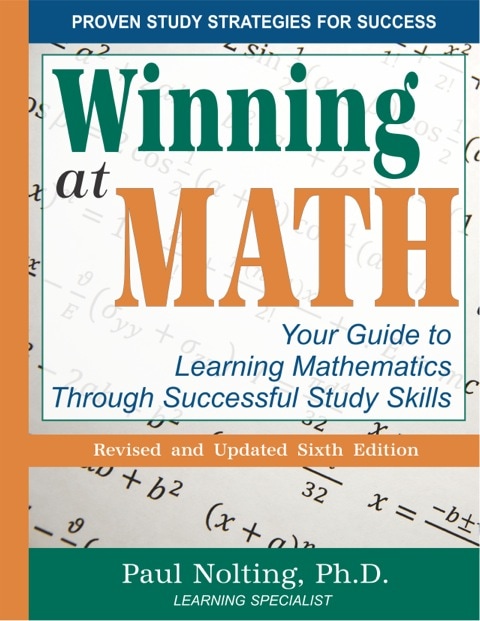Dr. Paul Nolting's Academic Success Press Blog: A Publication Dedicated to Math Success |
DR. PAUL NOLTING'S ACADEMIC SUCCESS PRESS BLOG
|
In 2008, the Journal of Developmental Education published an interesting article, written by Whetland and Donovan, which explored the placement process for the developmental mathematics department at an urban college in Ohio. The article particularly focuses on the use and efficacy of the ACT Mathematics and COMPASS Domain I (Algebra) placement scores for students entering college-level Intermediate Algebra courses.
The authors found that both of these tests are fairly accurate predictors of success in Intermediate Algebra; those students who perform well on the ACT and COMPASS tests are “more likely to succeed than fail.” This is important, they argue, for multiple reasons. First, they cite a study that shows that 22% of students in the 71% of colleges and universities that offer remedial math courses are either placed in or choose to enroll in one of these courses. From an institutional standpoint, this means that the efficacy of placement tests reverberate throughout a college’s entire mathematics platform. Second, for the students themselves, “the extent of a student’s need for remediation is inversely related to his or her eventual completion of a degree” (a 2005 quote they cite from Desimone, Smith, Baker, and Ueno). Those students who only need to take one remedial course are much more likely to persist through the process than those who are forced to take many remedial courses. Finally, the authors point out that remedial students acutely feel the effects of rising tuition costs, as they often need extra time to graduate. For students receiving financial aid, this puts an enormous amount of pressure on them to pass their first math course, as they risk losing aid upon failure. With all of this in mind, the authors studied 1,694 students (49.1% female, 50.9% male), most of them first-generation college students, as they entered an Intermediate Algebra course. All of these students either scored highly enough on their ACT tests or passed a COMPASS placement test during orientation to earn entry into their respective courses. The authors then compared individual ACT and COMPASS scores to eventual success percentages. The authors found that those students who received grades of A or B in their Intermediate Algebra courses had significantly better scores on their placement exams. Students who received a C, however, did not perform markedly better on the placement exams than did those who received a D, though these same C students did drastically outperform those students who eventually failed their respective courses. These scores demonstrate, the authors contend, that effective placement exams directly correlate to a student’s ability to succeed in Intermediate Algebra. Ultimately, the authors conclude that this information proves the overwhelming need for remedial math courses; however, placement exams must prove effective, as placing properly prepared students into remedial courses they don’t need wastes resources, while placing them in courses for which they are not prepared not only wastes resources but also largely jeopardizes a student’s chances to graduate. Universities must, then, set placement exam cutoff scores into extremely precise spheres, which do not allow borderline remedial students to slip through the cracks. For more, see: Donovan, W.J., Whetland, E.R. (2008) “Placement Tools for Developmental Mathematics and Intermediate Algebra.” Journal of Developmental Education Volume 32, Issue 2, Winter. Pages 2-11.
1 Comment
3/21/2020 10:54:32 pm
I don’t think there are still always on how I can understand mathematics in general! Ever since, I always find the subject really difficult, and I am pretty sure that there is no time of me to learn it. Developmental Mathematics and Intermediate Algebra both sound complicated, so I don’t think I have there enough eagerness to fight for it! But still the authors still need to come up with plans so that the students of today will learn from them. Thanks to Donovan and Whetland!
Reply
Leave a Reply. |
AuthorDr. Nolting is a national expert in assessing math learning problems, developing effective student learning strategies, assessing institutional variables that affect math success and math study skills. He is also an expert in helping students with disabilities and Wounded Warriors become successful in math. He now assists colleges and universities in redesigning their math courses to meet new curriculum requirements. He is the author of two math study skills texts: Winning at Math and My Math Success Plan. Blog HighlightsAmerican Mathematical Association of Two-Year Colleges presenter, Senior Lecturer-Modular Reader Contributions
|
Proudly powered by Weebly

 RSS Feed
RSS Feed